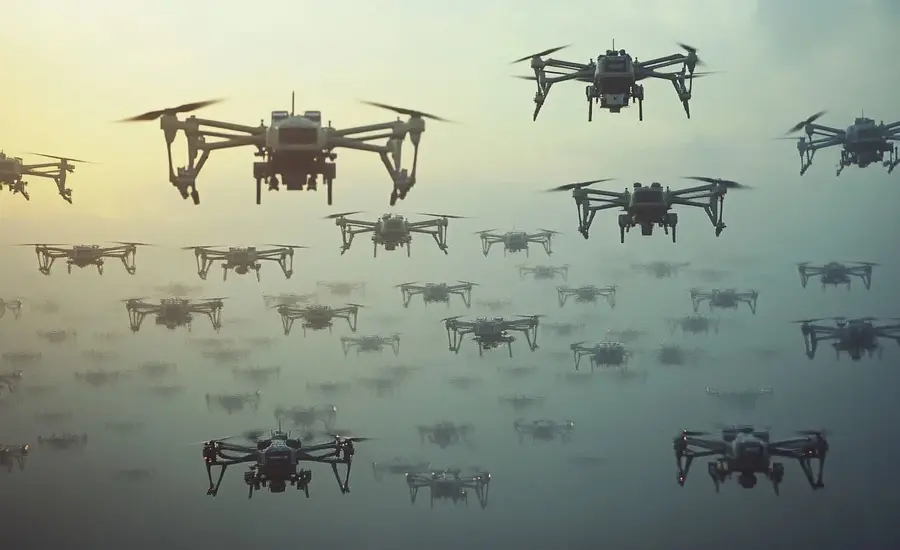Hyderabad: In a landmark move, Orvakal Industrial Area near Kurnool in the southern Indian state of Andhra Pradesh has been chosen as the site for India’s first-ever dedicated Drone City, to be developed as part of a larger Space & Drone City ecosystem.
The foundation stone was laid by Union Commerce & Industry Minister Piyush Goyal and Chief Minister N. Chandrababu Naidu during the 30th CII Partnership Summit in Visakhapatnam.
This project signals Andhra’s intent to become a major deep-tech hub, combining drone manufacturing, space technology, training, and cutting-edge mobility solutions.
Background of First Drone Space City India
The announcement builds on a flurry of initiatives by Andhra Pradesh:
- The state aims to attract up to US$1 trillion in investment over the next decade, emphasising deep-tech fields such as drones, AI, semiconductors, aerospace and quantum technologies.
- The Drone City will span 300 acres within a total ecosystem of 2,621 acres near Kurnool Airport, offering road, rail and air connectivity.
- Twin Space Cities are planned in Sri Sathya Sai & Tirupati districts, focusing on satellite manufacturing, launch logistics and start-ups.
Importance of the First Drone Space City India
1. Strategic for Defence & Technology – With drone capabilities becoming central to national defence and logistics, the Drone City is poised to strengthen India’s manufacturing ecosystem for unmanned aerial systems.
2. Economic Boost & Job Creation – The initiative is expected to generate tens of thousands of jobs (40,000+ direct and indirect) and draw large-scale investments.
3. Mobility & Innovation Leadership – Plans for drone taxis in two years, a Quantum Valley, eVTOL manufacturing campus, and advanced AI/data centre investment underscore Andhra’s ambition to be at the frontier.
4. Regional Development – Positioning Kurnool and nearby districts as high-tech hubs aids regional balance and offers infrastructure-led growth beyond traditional cities.
Key Challenges Ahead
Infrastructure & Connectivity: While the site is chosen, building a full drone ecosystem (manufacturing, testing, certification, pilot training) demands robust infrastructure, power, skilled workforce and regulatory clarity.
Talent & Skill Shortage: Training 25,000 remote pilots, establishing centres of excellence, and attracting specialist engineers will take time and commitment.
Regulatory & Safety Framework: Drone taxis, high-altitude drone operations and integrated airspace management require regulatory reforms and safety standards.
Investment Realisation: Announcements are large, but translating MoUs into tangible factories, supply-chains and exports will test execution capability.
Sustainability & Integration: Ensuring the techno zone connects with the local economy, ecology and supports inclusive growth is essential.
Key Implications
For Industry: Drone manufacturers, aerospace suppliers, AI/robotics firms will find a dedicated ecosystem and state incentives (e.g., 20% capital subsidy, full SGST reimbursement) to invest.
For Defence & Drone Use-cases: From logistics to surveillance, agriculture to disaster-management, India will gain a home-grown manufacturing base and testing ground.
For Economic Growth: With large MoUs already signed (e.g., Rs 3.49 lakh crore worth 40+ MoUs in Andhra) the region could see an industrial transformation.
For Society: Job opportunities, up-skilling local youth, and downstream industries (component manufacturing, services) will accompany the high-tech wave.
Globally: Andhra Pradesh positions itself as a viable alternative to global drone/space hubs, attracting foreign direct investment and export-oriented manufacturing.
Way Forward
- Clear policies for drone taxis, air-traffic integration, manufacturing standards and export support will accelerate growth.
- Partnering with universities, launching pilot-training programmes, setting up Centres of Excellence are key next steps.
- Power, connectivity (including rail/air), testing ranges, certification labs must be fast-tracked for investors.
- While large firms may anchor, smaller component suppliers and service firms need access to the ecosystem, incentives and finance.
- Local communities must be integrated via employment, environmental safeguards and infrastructure benefits.
- A transparent dashboard to track MoU to investment conversion, job creation and timeline adherence will build credibility.
- International roadshows, investor summits emphasising Andhra’s role as “gateway to India’s market” will help position the state.





























